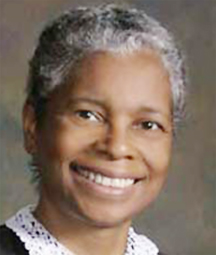US county judge in Tallahassee, Florida, Judith Hawkins, had many firsts when she became a judge in 1996 as she was the first African-American in the Second Judicial Circuit elected in a contested election, the first African-American county judge and the first African-American female county judge.
But at age fifty when she decided to become a travelling evangelist she may have had another first as the only US judge that uses their vacation to travel the globe and preach the word of God.

She has been to countries like Costa Rica, Kenya, the Dominican Republic, Taiwan, Romania, Mongolia, Papua, Indonesia, Mexico and Brazil preaching, and only yesterday wrapped up two weeks of ministering along with other evangelists under the US-based ShareHim ministries in conjunction with the Guyana Conference of Seventh Day Adventist (SDA) in various parts of the country.
And while she believes in the adage ‘temper justice with mercy’ Judge Hawkins in a recent interview with the Sunday Stabroek made it clear that she ensures that offenders are given whatever sentences they deserve.
“One of the things I have discovered, especially on the criminal side, is that people simply are held accountable. People make choices and they don’t really believe that they have to pay the penalty or the consequences for their choices, and one of the things I am known for is holding people responsible,” the US judge told Sunday Stabroek.
Judge Hawkins said she has had numerous examples of people who have not been held accountable and instead were able to “slip and slide and get away with things… and they do worse things.”
She said it is important for her to impress on defendants that there are consequences for their actions and they have the sole power as to which choice they would make and as such they cannot blame it on anyone or anything else.
“My job is to dispense justice… and I have taken an oath to dispense justice in accordance with the laws of Florida and the US constitution, and the laws of Florida say if you commit these crimes there is a penalty to be paid,” she stated.
As an evangelist, Judge Hawkins said she has been able to understand God’s role more as persons would talk about God being one of love, but she said that God‘s role is also one of justice and he holds persons accountable for their choices. “I find that oftentimes people just simply have not been exposed, trained, taught or required to take responsibility for their choices.
“I think people still believe it is not going to happen to them, that they are going to get away with it, that they wouldn’t get caught so when they are in my courtroom I have an opportunity to literally stop that train of thought…” she said.
And this judge is not moved by tears although she realizes people will think that as a woman she will be. However, Judge Hawkins said whenever a woman cries before her, she asks them to stop and offers them a box of tissues.
“The time to cry is before you make the choice and did what you did, and that is why I find it so fascinating when the defendant would say to me that ‘I can’t go to jail because I have these children or I have this job.’ I just look at them and go, did you have these children when you did the crime? Did you have the job when you broke the law?”
The judge said she finds no conflict between her work as a judge and that of an evangelist as in the court she has to uphold the law since she took an oath to do so. But she said she has the ability to dispense mercy and grace along with justice.
Misdemeanours
As a county judge, Hawkins’ can sentence someone up to a year in jail for a misdemeanour crime, but a person can be charged with different counts and they can receive a year in jail for each count. In civil cases she can award up to US$15,000 to a claimant.
“We call county courts the people’s court; that’s where we see a really high number of people on both the criminal side and civil side,” Judge Hawkins said. She explained that many of the persons on the civil side are not represented by lawyers, and as such it is important for her to have the ability to listen to what people are saying and figure out what they are trying to tell her. In this position Judge Hawkins said she has to constantly pray for wisdom.
But on the criminal side she said she is happy that she is a county judge since she does not have the law dictating how she can sentence a defendant and she can be creative.
“And one of the things that I have done that I was really proud of is that I had young people in my courtroom that were driving without licence and I would sentence them to community service… but I would tell them they could work off the community service hours by improving their grades,” she said.
As a result Judge Hawkins said she has seen students improve their grades so much that it was a life-changing experience for them and they finally realized that they could do well in school, and some actually made honours with straight As.
Judge Hawkins said she found that there is a great correlation between lack of a high school diploma and unemployment and criminal behaviour, and as a result she would encourage defendants to read for the equivalent of a high school diploma. Several took her advice and some were able to go on and get their associate degrees.
“And those are what I call life-changing experiences. So you are in the courtroom for a crime but as a judge I have the discretion and the opportunity to literally fashion a penalty which is restorative, rehabilitative as well as punitive,” she said.
Talking about her path to becoming a lawyer, Judge Hawkins recalled that it was after her husband had gotten his doctorate and she got her masters they moved to Florida and she started working as a condominium specialist for one of the State Department offices in Florida. However, she soon realized that it was not the job for her. “One day, when my supervisor was reprimanding me I just kind of smiled and got I up and walked out of her office and applied to law school – the law school was just diagonally across from the office building,” she told the Sunday Stabroek.
After graduating from law school she worked with a law firm before opening her own law firm in 1985 practising family law, and it was in 1996 she got the opportunity to campaign for a judgeship.
“It [the campaign trail] was fun because it was an open seat and there were about nine of us in the race, so I was surprised that I came in second, and then the two of us went to the elections and the Lord gave me 52% of the votes,” the judge said.
The first term was four years, so in 2000 she had to run again, and even though she had opposition she was re-elected with 70% of the votes. Now she does not have opposition any more, and this year she was re-elected again unopposed and will start her last six-year term since when she attains the age of 70 she can no longer serve as a judge.
Judge Hawkins said she is surprised that people are amazed that she works as an evangelist even as she sits as a judge, but she pointed out that everyone is entitled to vocations and she is just using hers to make her mission trips.
Her evangelistic work has made her realize how similar persons are throughout the world, and even though their colour or cultures might be different all are human with the same thoughts, desires and hopes. “Everywhere around the world parents want better futures for their children, all around the world people deal with heartaches and disappointments, sorrows and pain… People die everywhere…”
Judge Hawkins is married to James Hawkins, Dean of the School of Journalism and Graphic Communication at the Florida A&M University. They have one son.





